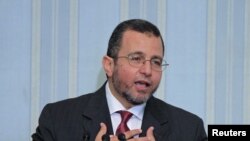An Egyptian scholar said the country’s new Cabinet has at least two months to resolve security and economic challenges before citizens take to the streets again in protest.
Said Sadek, professor of political sociology at the American University in Cairo, said the Cabinet, mostly composed of technocrats, has drawn a mixed reaction from the public.
He said some Egyptians are unhappy about the presence of prominent members of the Muslim Brotherhood.
“You have some skeptics [who] find that some of the positions are given to the Muslim Brotherhood, like the Information Ministry, for example, [given] to the head of the Egyptian Journalist Union, who is well known to be a prominent leader of the Muslim Brotherhood,” said Sadek. “And so, they are concerned about the freedom of expression in the country, censorship and what will happen from that.”
President Mohamed Morsi Thursday swore in the new Cabinet, which includes key positions for holdovers from former President Hosni Mubarak’s era.
Some of those officials include Field Marshal Mohamed Hussein Tantawi, who was named as defense minister. Other holdovers include Foreign Minister Mohammed Kamel Amr and Finance Minister Mumtaz al-Said.
Prime Minister Hisham Qandil defended his Cabinet selections saying he chose ministers based on competence.
Sadek said the new cabinet faces tests.
“It is facing many challenges; restoring security [and] the economy is a big problem. In fact, it took them a long time to come up with the minister of economy because many were rejecting this post because they felt it has too many challenges and obstacles,” said Sadek.
He said it is unlikely the newly sworn-in Cabinet will last long. Sadek said the upcoming national referendum on the new constitution, as well as the parliamentary election, could pave the way for a new Cabinet.
“We don’t think this is a cabinet that will last for a long time. This is [a] cabinet that you can consider as transitional.” said Sadek.
He said critics say the new Cabinet is not representative on the basis of religion, gender, regional and ethnic balance.
“People are not taking that as a big issue now because they think that this is a government of technocrats. People who deal with very important urgent business; power is being cut every now and then in several parts of Egypt, water problem, security problem… so, it doesn’t matter who is there. What matters now is who [can resolve] all those problems. Then, after that we will have the luxury to talk about how many women, how many Copts.”
Said Sadek, professor of political sociology at the American University in Cairo, said the Cabinet, mostly composed of technocrats, has drawn a mixed reaction from the public.
He said some Egyptians are unhappy about the presence of prominent members of the Muslim Brotherhood.
“You have some skeptics [who] find that some of the positions are given to the Muslim Brotherhood, like the Information Ministry, for example, [given] to the head of the Egyptian Journalist Union, who is well known to be a prominent leader of the Muslim Brotherhood,” said Sadek. “And so, they are concerned about the freedom of expression in the country, censorship and what will happen from that.”
President Mohamed Morsi Thursday swore in the new Cabinet, which includes key positions for holdovers from former President Hosni Mubarak’s era.
Some of those officials include Field Marshal Mohamed Hussein Tantawi, who was named as defense minister. Other holdovers include Foreign Minister Mohammed Kamel Amr and Finance Minister Mumtaz al-Said.
Prime Minister Hisham Qandil defended his Cabinet selections saying he chose ministers based on competence.
Sadek said the new cabinet faces tests.
“It is facing many challenges; restoring security [and] the economy is a big problem. In fact, it took them a long time to come up with the minister of economy because many were rejecting this post because they felt it has too many challenges and obstacles,” said Sadek.
He said it is unlikely the newly sworn-in Cabinet will last long. Sadek said the upcoming national referendum on the new constitution, as well as the parliamentary election, could pave the way for a new Cabinet.
“We don’t think this is a cabinet that will last for a long time. This is [a] cabinet that you can consider as transitional.” said Sadek.
He said critics say the new Cabinet is not representative on the basis of religion, gender, regional and ethnic balance.
“People are not taking that as a big issue now because they think that this is a government of technocrats. People who deal with very important urgent business; power is being cut every now and then in several parts of Egypt, water problem, security problem… so, it doesn’t matter who is there. What matters now is who [can resolve] all those problems. Then, after that we will have the luxury to talk about how many women, how many Copts.”





